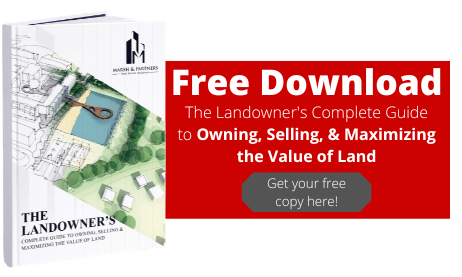Here’s one of the hard truths about real estate that very few people have discussed over the last...
The Landowner's One-Stop-Shop
Delivering more profitable outcomes for landowners across all types of properties
The Landowner Experience
Landownership is a complex business. We're here to try and simplify it for you. Check out this brief introduction from one of our preferred local real estate agents and land partners, Walter Ciucevich of Sanford Surrounded Real Estate.
Successfully owning land is all about arming yourself with the right knowledge to make informed and profitable decisions. The more you know about your property, the needs of the market, and what real estate developers and investors are looking for, the more likely you'll achieve a positive outcome.
There are a couple of routes real estate landowners traditionally take:
- Sell the land "as-is" as quickly as possible
- Maximize land value before selling
- Pursue land entitlements even if they aren't thinking about selling
- Develop the land themselves
Each comes with different risks and challenges, but as a result, different potential returns.
The question is, what strategy makes sense for you, and how do you implement it?
Our goal is to help answer some of these exact questions. You'll find this page is packed with great resources to help landowners achieve more profitable outcomes.
Table of Contents
What you'll find on this page:
Selling Land "As-Is"
There are all sorts of ways you can improve a piece of property - the question is, will any of those improvements make it easier to sell your land? Will they even increase the property value?
They're valid questions and often don't have a straightforward answer. Maybe the answer is to simply sell your land "as-is" for as must cash as quickly as possible.
Does any of this sound familiar?
- You're stuck with land that was passed down to you; now it's time for you to figure out what to do with it.
- You're tired and just want to exit land ownership altogether.
- You own some raw land in the middle of nowhere and can't figure out how to sell it.
- You've had bad experiences with real estate agents in the past not being able to sell your property.
- You're just paying property taxes on land that you aren't doing anything with.
- You want to turn your non-income earning land into a cash-flowing investment property.
- You're behind on property taxes, and it makes sense to sell quickly instead of trying to play catch up.
The point is, there are endless reasons why it might make sense to just sell a property fast. Just getting into the mind of a buyer can be hard - you might simply want to have the buyer conduct their own due diligence.
That means you might not get top dollar for the property, but you won't have to spend money out of your pocket, and the buyer will do the work for you.
At Marsh & Partners, we can help make selling your property "as is" a reality by turning that property into cash.
We are real estate developers, which means we buy land directly from owners. And because we buy directly from owners, that's a hassle-free alternative to the traditional real estate transaction most of us have grown accustomed to.
Most real estate agents don't truly understand land. And to be able to value a property, you need to understand land development and all the things that impact how and what can be built on a property.
That's where we can help. We're land experts. We've navigated the land entitlement and real estate development processes countless times. We understand real estate due diligence, how to value property, and will get you a fair offer and buy your land directly.
So, if you own land in North Carolina and want to turn it into cash quickly, you can get started by filling out the form below. 👇👇👇
We buy land directly if you want to sell your NC land quickly for cash. No hassle closings, no additional fees - get started on your way to getting a quick cash offer.

Maximize Land Value Before Selling
Every landowner has different goals. And maybe instead of selling your property right away, you want to make the land more valuable to sell in the future.
One of the most common ways to make your property more valuable is by getting the permits and approvals a builder would need before they can build. These are called land entitlements.
But that process doesn't come without risks, especially if you aren't well-versed in the real estate due diligence or land entitlement process.
There are a couple of ways that you can increase the value of your land before selling it:
- Do some light real estate due diligence & feasibility work
- Partner with a real estate developer
- Entitle the land yourself and sell the land and the project to a builder or developer
- Lease the land
- Develop the property yourself
All that's great on paper... but how do you know if it even makes sense to try to maximize land value?
None of these decisions come without implications. The more you take on as a landowner before you sell it, the more your land is worth, but the more risk you assume. And the decision of whether to maximize the value of your property can't be made in a vacuum. It's important to consider other factors like:
- When is the right time to sell your land - market dynamics, the path of development growth, the real estate life cycle, and personal goals all impact when it makes sense to sell
- Consider who would be the end-user or potential buyer
- How much can you invest in land entitlements, and is it worth the risk
- What real estate due diligence items are important to a potential buyer
At first glance, this all might come across as overwhelming. So we put together a "land ownership 101" video to give you the information you need to make smarter land decisions. You can watch the video here.
Clearly, there is a lot to consider as a landowner - when to sell, how to sell, why to sell, etc. But before you can answer any of those questions and before you can decide if it makes sense to maximize the value of your property, you need to understand how land is valued.
What makes one piece of land more valuable than another? It's a complicated question and requires a knowledge of the development process and real estate due diligence. As a landowner, you'll need to understand what impacts the value of your property - access to utilities, topography, estimating sitework and land development costs, the presence of streams & wetlands, off-site improvements, and much more.
For a deep dive into land valuation and some of the things you'll need to know in order to maximize the value of your property, check out our landowner resources below.
The Role of a Real Estate Development Consultant
The real estate industry has evolved into a series of silos where professionals deliver services according to their priorities.
In other words, civil engineers are experts in land planning and site plans. Architects are experts in building design and navigating building codes. General contractors are experts at handling subcontractors and making sure projects are built on time and within budget. Other project consultants may be experts in soil studies and geotechnical explorations or stream & wetland delineations and permitting. But there isn't an expert in everything - ultimately that falls on the landowner or real estate developer.
Landowners lack a "one-stop-shop" when assessing a property's feasibility, navigating the land entitlement process, or maximizing a property's value.
And development continues to get more complex - municipalities are adding more friction to the development process, so landowners are faced with more challenges than ever to maximize the value of their property.
And what happens is owners can get themselves into a situation where they don't sequence their real estate due diligence tasks properly, and they end up spending money either on bad advice or because of their own inexperience.
Those mistakes add up quickly, especially if you're spending thousands of dollars on land entitlement work that doesn't increase the property's value.
If all you want to do is sell your property "as-is" for cash as quickly as possible, a consultant likely isn't for you.
But if you're interested in maximizing the value of your land, or achieving a more profitable highest & best use, a real estate development consultant offers an alternative to this outdated model. Their expertise spans traditional industry silos, giving landowners the insights and guidance they need to make more profitable decisions.
Marsh & Partners has helped landowners turn vacant land into income-producing pieces of real estate.
And we don't just help owners develop their property. We can coach landowners through real estate due diligence, feasibility, land entitlement, or just on repositioning their property to maximize value.
You can get started with a free consultation call by booking some time on our calendar here.
Landowner Resources
Download your free copy of our Landowner's Complete Guide to Owning, Selling, & Maximizing the Value of Land. The 40+ pages are packed with useful information to help landowners make smarter, more profitable decisions.
There has never been a great place to go to just learn about land. So with this guide, our goal is to finally end the information asymmetry that has hurt landowners for so long.
You can also check out a couple of articles specifically geared for landowners below. 👇👇👇
Landowner Frequently Asked Questions (FAQs)
Q: How much is my land worth per acre?
A: The short answer is, "it depends." One method of determining value is by using the comparable sales approach - comparing your property to recently sold pieces of land nearby. This is a quick and easy way of determining the possible approximate value, but it fails to consider the uniqueness of every piece of land.
In practice, a property's value is influenced by everything that will impact the amount of site work and land development required. So a property that requires more development and supports a less valuable end use is not as valuable as land that supports more profitable development.
Q: How much is a soil study?
A: There are several different kinds of soil studies. A common assessment is known as a "perc" test. A perc test and soil map will give an owner a better idea about the land's usable soils for an underground septic system. This assessment will normally cost anywhere from $2000-$5000, depending on the size of the land.
Two alternative soil studies are a stream & wetland delineation and geotechnical investigation. The former will cost a couple of thousand dollars, while the latter is more expensive and normally costs $7500+, depending on the extent of the proposed development.
Q: How much is a survey?
A: This depends on the size of the property and what exactly you need to be surveyed. A boundary survey is the most common and may only cost a few thousand dollars. If you need topography and improvements surveyed, or underground utilities and trees, a survey can cost as much as $20,000+ for larger properties.
Q: How do I subdivide my land?
A: This is a loaded question. Every municipality has a different set of rules and regulations governing subdivisions. And depending on how exactly you're trying to subdivide the land, those rules will change.
The first place to look for information is the municipality's unified development ordinance (UDO). That's usually where all the development and design ordinances are codified. If that's overwhelming, it may make sense to engage a real estate consultant or civil engineer to help you navigate the process.
Q: Do I need to do anything to my land before I can sell it?
A: Not necessarily. If you want to sell your land "as-is," you can simply list the property with a real estate agent, or contract with a buyer or real estate developer directly.
However, if you're interested in trying to maximize the value of your property before you sell it, there will be some work required, and you should expect to spend some additional money. Land entitlements are a great way to increase a property's value, but you can check out our article "3 Tips for Maximizing Land Value When It's Time to Sell" to learn more.
We have an entire article dedicated to answering the frequently asked questions we hear from landowners. You can check that out at, "Landowner FAQs: What Property Owners Should Know About Owning Land."
Latest Industry Trends & Insights
To build a commercial real estate property or engage in most land development activities, you need...
Real estate is a localized asset. Its value is influenced by things like tax rates, the local...
Schedule a Meeting
I'm always excited to chat with folks who are interested in talking about land - what their land is worth, how to increase its value, potentially developing the property, or just kicking around ideas. Land is such a misunderstood asset class that it's important to have a sounding board to make complex decisions.
Schedule a 15-minute introductory call with me to talk about your goals and how our unorthodox approach to land might be able to deliver you more value for your property.

-1.png?width=600&height=545&name=My%20project-1%20(2)-1.png)









